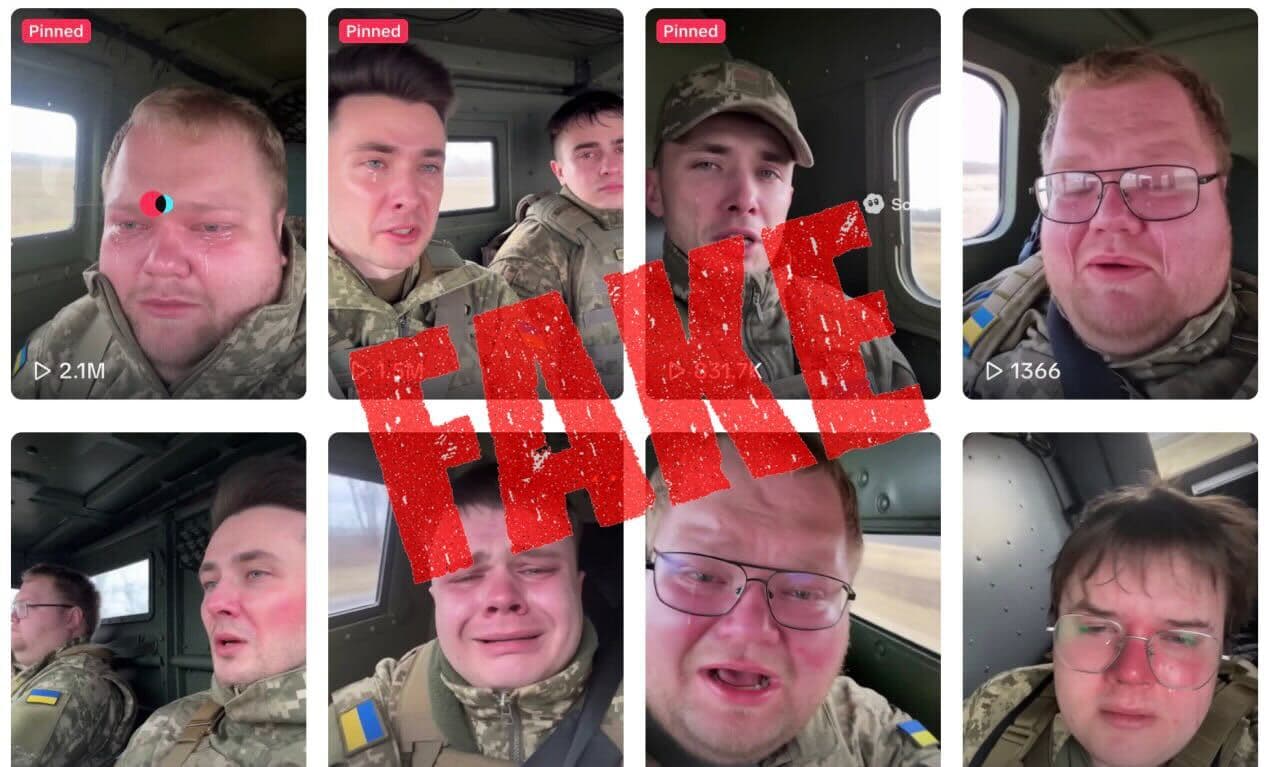AI soldiers: How deepfakes are manipulating Ukraine’s mobilization narrative

A screenshot of the account spreading AI-generated videos with fake 'Ukrainian soldiers' taken on Nov. 4, 2025.
Editor's note: This article was published as part of the Fighting Against Conspiracy and Trolls (FACT) project, an independent, non-partisan hub launched in mid-2025 under the umbrella of the EU Digital Media Observatory (EDMO). Click here to follow the latest stories from our hub on disinformation.
Tears, panic, and young Ukrainian soldiers pleading for help — a new disinformation campaign using artificial intelligence (AI) to fabricate videos of Ukraine's mobilization efforts is flooding social media platforms.
Fake profiles on TikTok, X, and other platforms are spreading AI-generated videos subtitled in multiple languages. The clips, viewed millions of times, depict alleged "forced mobilization" of 22- and 23-year-old Ukrainian men supposedly being sent to the front.
Experts say the campaign marks a new stage in the Kremlin's information warfare — one designed to erode trust in Ukraine's leadership, sow panic, and weaken Western support.
"The information space is a battlefield, and that's why (Russia) works tirelessly to push its narratives," said Anton Kuchukhidze, an international political scientist and co-founder of the United Ukraine think tank.
AI fakes flood social media
The latest disinformation wave centers on fabricated stories about mobilization.
A TikTok account that appears to be the original source of the videos has posted at least a dozen clips depicting supposed AI-generated figures posing as Ukrainian soldiers in uniform.
The account is anonymous, using only a nickname, but its reach has been vast — with some videos receiving more than two million views.
In one of the most viral clips, an AI-generated "Ukrainian soldier" claims he was "mobilized" and sent to the town of Chasiv Yar in Ukraine's eastern Donetsk Oblast.
"Help me, I don't wanna die, I'm just 23 years old," the man says in the video.
Using Hive Moderation, an AI-based content detection tool, the Kyiv Independent verified that both the audio and video were generated using Sora, an OpenAI text-to-video model.
Sora can generate realistic video clips from text prompts, a technology with legitimate creative applications but, in Russia's hands, a potent weapon for deception.
Several videos even display the "Sora" watermark, which identifies that the content is artificial.
One of the campaign's main false claims is that 23-year-old Ukrainian citizens are being drafted. In reality, Ukraine's law clearly sets the minimum mobilization age at 25.
Kyiv lowered the draft age from 27 to 25 in April 2024 — not younger.
Ukraine's government-run Center for Countering Disinformation said the soldier's face shown in the video belongs to a Russian citizen, not a Ukrainian, but did not provide further details.
Targeting two audiences
The latest disinformation push is aimed at both Ukraine's and international audiences.
According to the disinformation monitoring team at the LetsData company, the Kremlin's narratives portray Ukraine's mobilization as coercive, featuring claims of men being "kidnapped" or "hunted" by recruiters.
The goal, analysts say, is to foster resentment, depict the war as "(President Volodymyr) Zelensky's war," and undermine trust in Ukraine's military.
"These narratives are amplified by malign actors to undermine support for the Ukrainian Armed Forces and fuel anti-government sentiment," LetsData told the Kyiv Independent.
The content is tailored linguistically for impact. While most videos appear in Ukrainian, versions in Russian — and even English — are designed for wider circulation.
Telegram, Facebook, and TikTok remain the main platforms for spreading such content.
What Moscow wants
While the content spreads fast and reaches broad audiences, its purpose is clear — and far from harmless.
Russia's disinformation offensive operates on three fronts — inside Ukraine, among Ukrainians abroad, and internationally — all designed to weaken Ukraine's unity and erode its global standing, Kuchukhidze said.
In Ukraine, Moscow seeks to "undermine morale in the ranks of the defense and security services," he said. "Russia believes that the more negativity and demonization they spread about Ukraine's defense and security forces, the more public dissatisfaction will grow."
Donald Jensen, a former U.S. diplomat and lecturer in Russian foreign policy at Johns Hopkins University, echoed this view, saying Moscow is attempting to demoralize Ukrainian society and undermine confidence in its war effort.
"Russia thinks it's winning the war, but Russia realizes the front is not moving as fast as it should," Jensen said, arguing that the Kremlin aims to "undermine the war effort in Ukraine" by amplifying narratives about mobilization being "cruel and unfair and arbitrary."
The Kremlin also aims to sow distrust between Ukraine's military and political leadership, fracturing what Kuchukhidze calls the country's "unity triad — government, army, and people."
Another level of disinformation targets Western audiences, where Moscow works to advance the narrative that Ukraine "cannot fight and cannot win," Kuchukhidze said.
Jensen noted that Russia intends to "demoralize and make the support weaker, especially in Europe," capitalizing on political divisions and wavering enthusiasm among Kyiv's partners.
According to him, Russia understands that Ukraine's allies "are not uniformly enthusiastic about supporting" Kyiv and tries to deepen those splits to erode long-term commitment.
Despite this, Kuchukhidze stressed that Ukraine's battlefield performance has already upended long-standing assumptions in the West.
"Ukraine proved to Europe that Russia can and must be resisted," Kuchukhidze said. "That undermines a myth Russia spent 20 years spreading — that it was the world's second-strongest army."
Additional reporting by Abbey Fenbert.
Note from the author:
Hi, this is Tim. The author of this article. Thank you for taking the time to read it. At the Kyiv Independent, we don't have a wealthy owner or political backing. We rely on readers like you to support our work.
If you found this article interesting, consider joining our community today.









